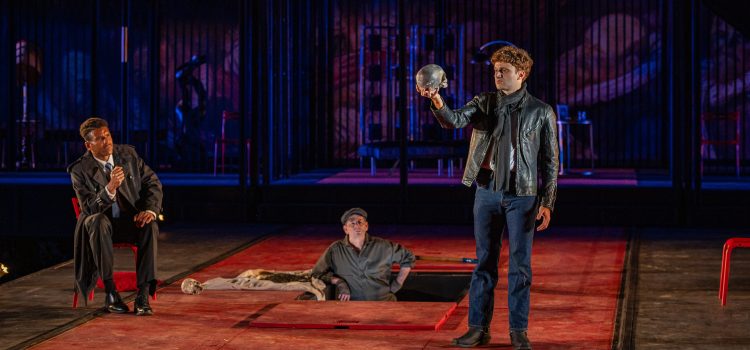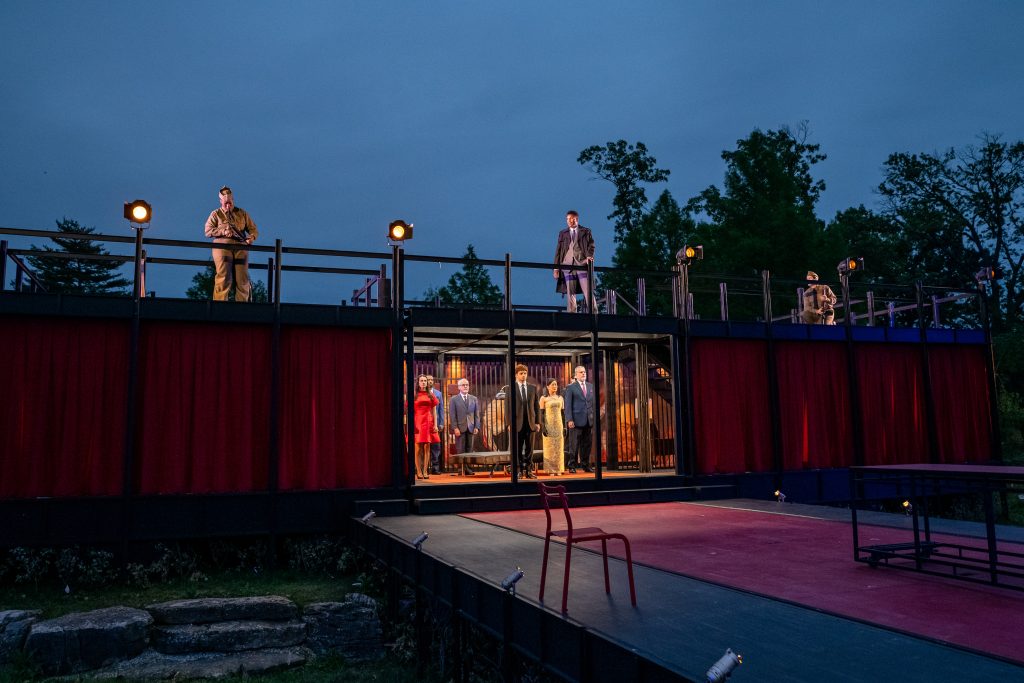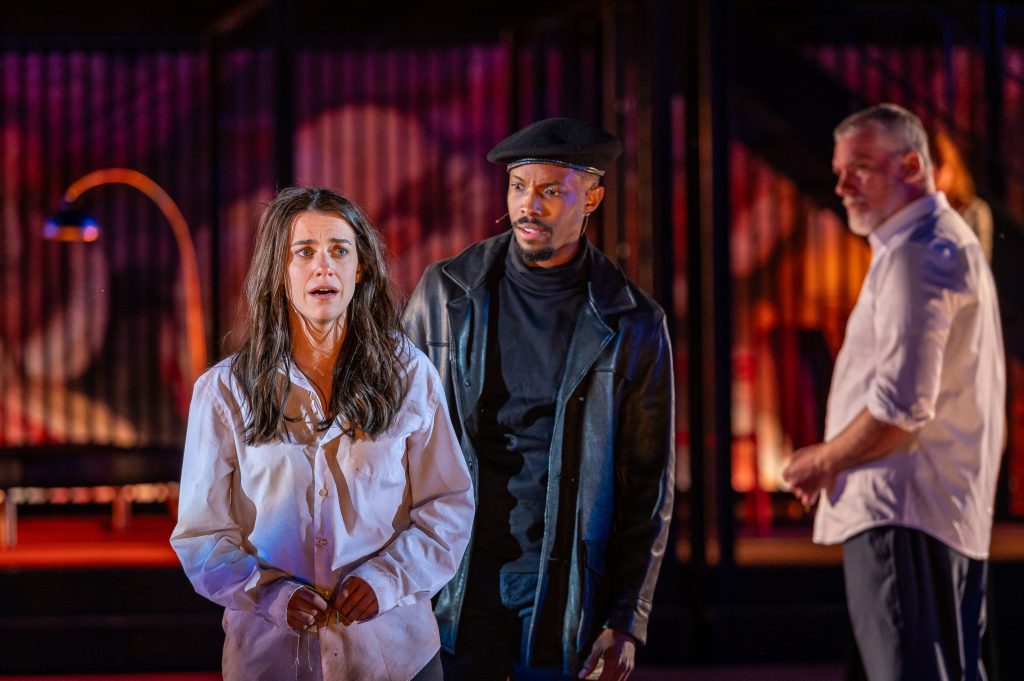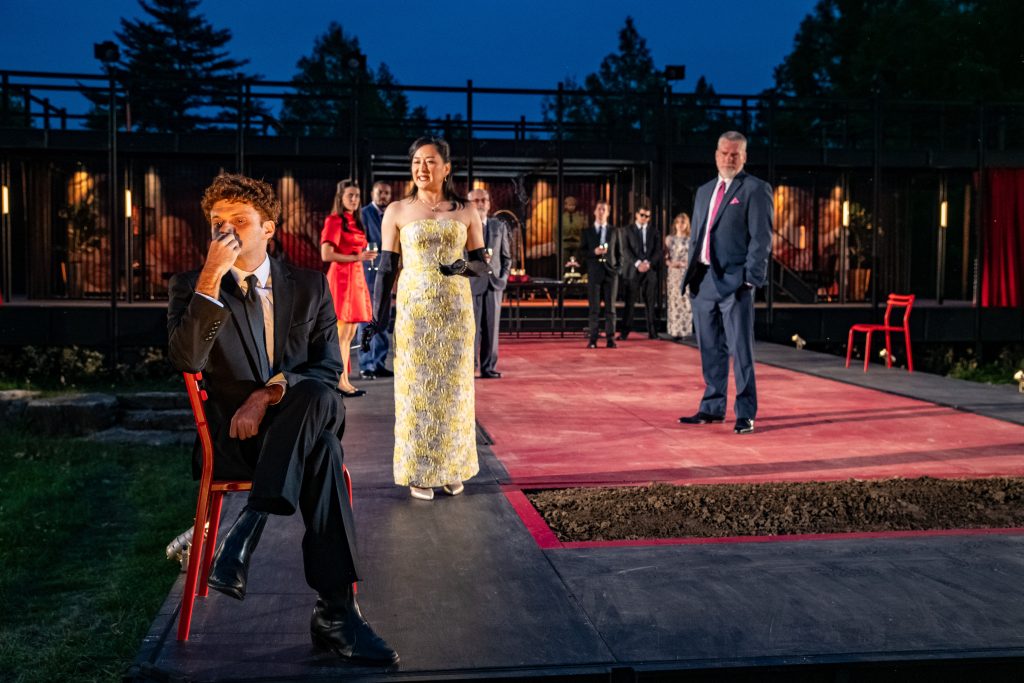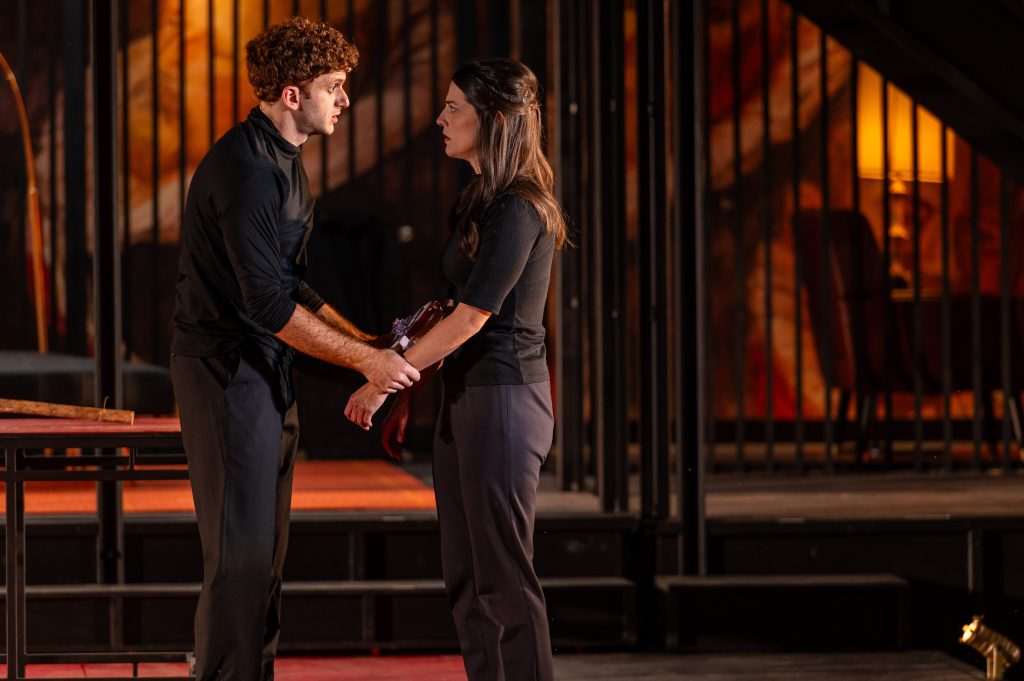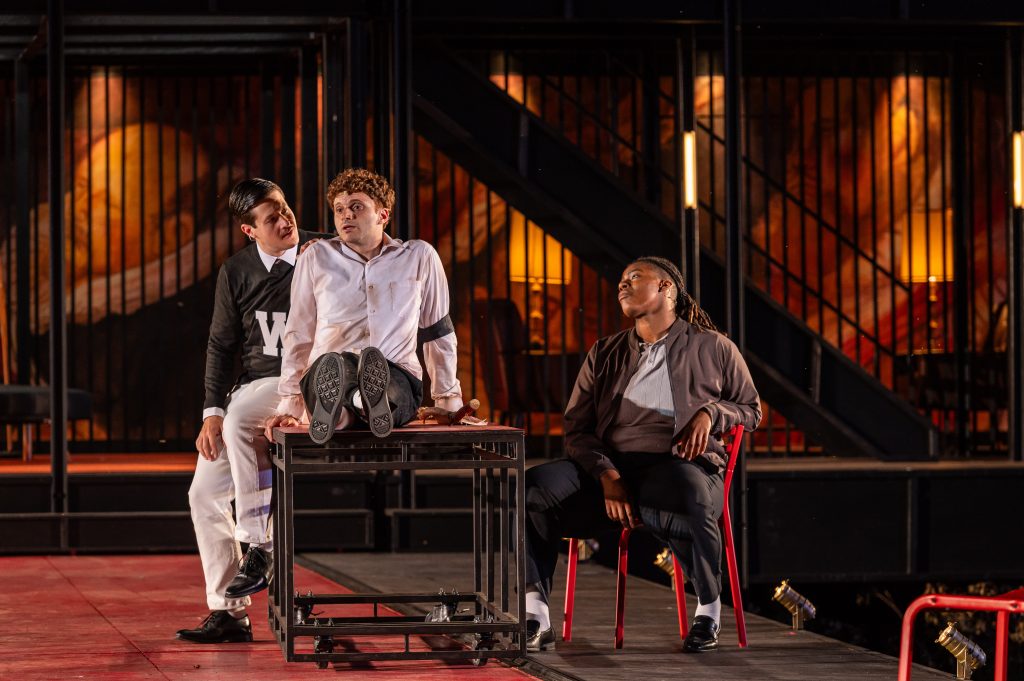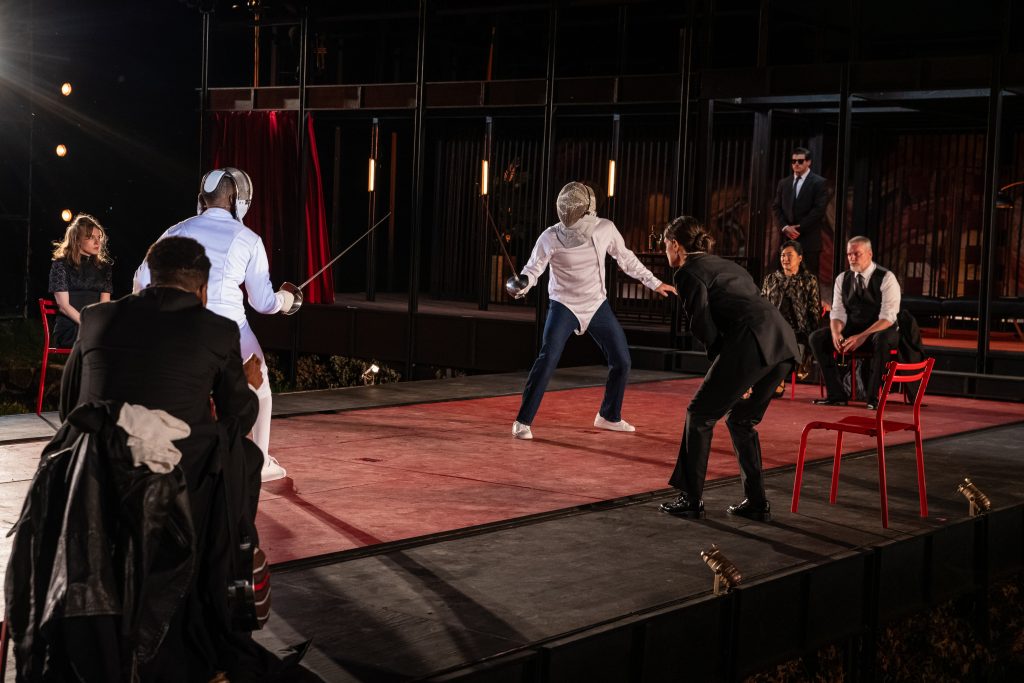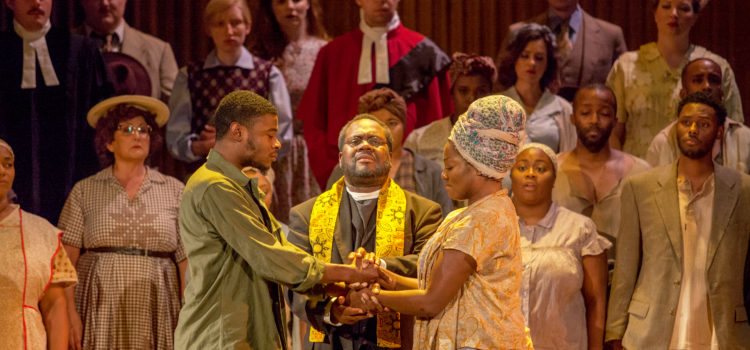By Lynn Venhaus
A grizzly bear, crocodile, prairie dog, red panda, and tiger dance into a party in Zoorona, and we get a bouncy beat, a perky vibe, and a bright-eyed and bushy-tailed family-friendly adaptation of Shakespeare’s classic love story, revived as “Romeo and Zooliet.”
After all, what’s in a name? “That which we call a rose by any other name would smell as sweet.” What if the animal kingdom put on their own show in the friendly confines of a public zoo?
This inspired first-ever collaboration between St. Louis Shakespeare Festival and the Saint Louis Zoo is staged in a grassy, wooded valley area known as “Historic Hill,” between the sea lions and Cat Country on the zoo’s south side.
It is an enchanted setting on a midsummer night, and even a rain delay and sound glitch on Friday, July 11, couldn’t dampen the enthusiasm and enjoyment, particularly of the young and the young at heart.
Ingeniously camped in a performance space named “The Glowb,” clever large custom-made animal puppets cavort in their make-believe habitats, courtesy of Shakespeare-trained actors nimbly operating their characters while they provide the voices and the movements.

The synergy between playful puppeteers is uplifting, especially when you have a tale aimed at young audiences that is an ode to friendship. (In crossing the biological divide, no animals were harmed in this charming presentation).
The tragic-free conflict, created with wildlife behaviors in mind, is that cuddly bear cub Juliet, an omnivore who leans towards being a vegetarian, becomes best friends with adorable prairie dog Romeo, an herbivore who eats plants.
They don’t mind their differences and want to spend time together without their friends and families interfering. Those colorful characters are not feuding; they’re just from different clans.
Playwright Jennifer Joan Thompson’s imaginative script, based on a 2015 graphic novel, “The Stratford Zoo Midnight Revue Presents Romeo and Juliet,” which was written by Ian Lendler and illustrated by Zack Giallongo, takes flight in this delightful zoo setting.
An exuberant Ricki Franklin, a master interpreter of Shakespearean iambic pentameter, is the sweet Juliet seeking a best buddy. Franklin is a two-time winner of the St. Louis Theater Circle Award for performer in a supporting role for “Twelfth Night” and “As You Like It,” two recent outdoor productions in Shakespeare Glen, and her vibrant stage presence is welcoming.

Agile Jordan Moore plays nice Romeo, smitten with Juliet in a way where it’s the platonic version of “Did my heart love till now? forswear it, sight! For I ne’er saw true beauty till this night,” and wants to hang out after they dance.
Juliet’s controlling mom, Lady Capulet, has other ideas — to have a play date with Paris, a smarmy crocodile with ulterior motives, for he sees a meal ticket. Nisi Sturgis’s suppleness in moving with an enormous bear apparatus above her head is impressive.
Adroit Ryan Omar Stack cunningly delivers his double entendre lines, trying to cover up his hearty appetite. He also portrays the prince, who is a sage sea lion (and easily distracted by balls!)
Zookeepers have gone home for the evening, and assorted critters come alive for fun and adventure. The remarkable puppets were designed and fabricated by Michael Curry Design. They collaborated with Julie Taymor for incredible “The Lion King” puppets, so no wonder these are striking in detail.
All the characters are animals that can be found in the Saint Louis Zoo – and on your way in and out, you can watch the prairie dogs’ antics as they go about their evening.

Narrators are a penguin, their offspring, and a puffin. Bryce Cleveland is Puff, Genevieve Mazzoni is Penny. Rian Page and Sophie Stogsdill are also listed in the program.
An animated Jacob Schmidt is a gleeful Mercutio, ready to dance, but he clashes with Juliet’s cousin, Tybalt (the always vivacious Rae Davis). He’s more laid back, she’s friskier – but they both are protective of their pals.
Schmidt also makes a comical entrance as an ambling tortoise, Friar John, ready to dispense his wisdom. He’s quite a crowd-pleaser.
The mellifluous Jeff Cummings is Friar Lawrence, a wise owl, while Olivia Scicolone is a marvel of motion as a hippo, who is quite limber as Juliet’s fussy nurse.
Rising stars Charlie Mathis and Daisy Held are the capable swings throughout the run.

Scenic designer extraordinaire Scott C. Neale has fashioned a rustic performance space that’s part clubhouse, treehouse, campground and stage – with interesting nooks and crannies for the animals to pop in and take off from.
Jesse Klug’s lighting design incorporates fairy lights, and their illumination elicited ‘aws’ from the crowd.
Costume designer Rachel Adorno, in tandem with Caitlin McLeod, associate costume designer and additional puppet fabrication, give the animals distinct personalities – including sparkly masks for the party scene, to convey the whimsy. Eric Barnes managed the props.
With his keen eye for detail and his zest for high-spirited, fun-filled action, producing artistic director Tom Ridgely has helmed this show laser-focused on cheerful entertainment for all ages, especially wide-eyed youngsters.
Ridgely, as he always does, has included exceptional creatives on this show’s roster. His team included producer Colin O’Brien, associate producer Ryan Jeffery, stage manager Sarah Luedloff and assistant stage manager Britteny Henry.
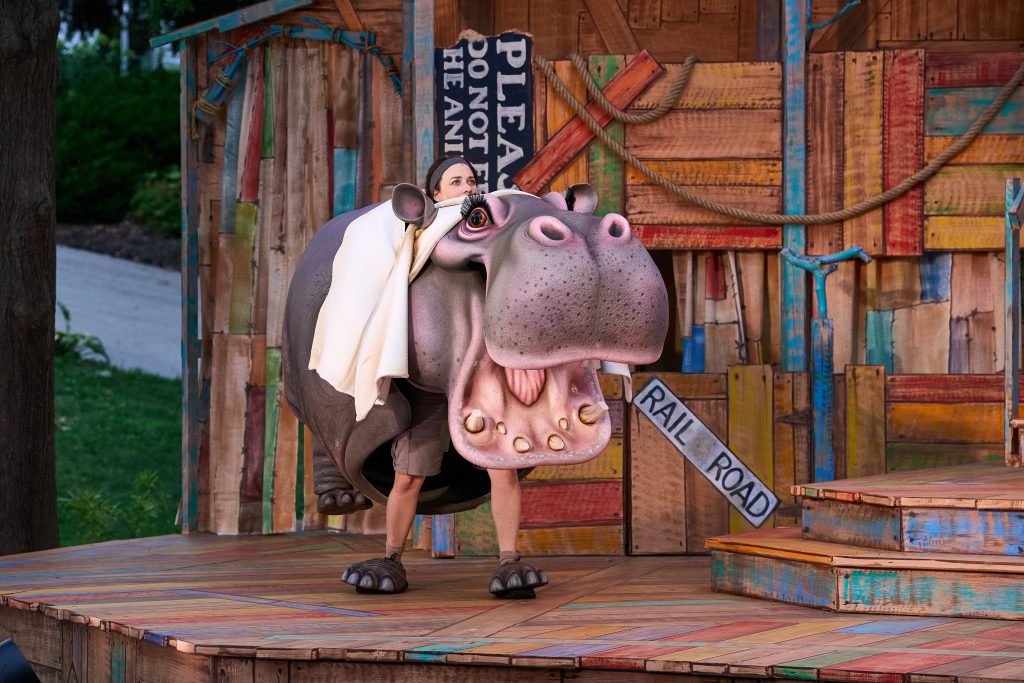
The 80-minute show includes catchy pop tunes, with a sensational signature song “Just Like Romeo and Zooliet,” the show’s own interpretation of a song first recorded in 1964 by The Reflections.
It has been re-arranged by music supervisor Jeffrey “JQ” Oaiyum, and sung by JQ and Kiley B. Moore, with background vocals by Sophie Dimitroff and trumpet playing by Marques Carroll.
JQ is part of The Q Brothers, which have been involved in several shows presented here by the St. Louis Shakespeare Festival. A Chicago composer, he also works on the Emmy-winning Hulu series “The Bear.”
The peppy music numbers are choreographed by Sam Gaitsch, and Steve Ptacek did a terrific job with sound design. Zev Steinrock choreographed the fights.

While it’s briskly performed and pleasantly presented, “Romeo and Zooliet” is a massive undertaking, so no small feat for all involved to create such a magical, purposeful experience.
With an entire village of artisans, Ridgely good-naturedly directed this groundbreaking attempt to unite two different worlds, and we’re the better for it.
If you’re like me, you’ll leave grinning ear to ear, hearing little tots giggling being the best sounds of all on a summer’s eve. (And it’s not every day you hear barking sea lions ready to go to bed).
St. Louis Shakespeare Festival presents “Romeo and Zooliet” Tuesdays through Sundays at 7:30 pm from July 8 through Aug. 17. Performances take place at the Historic Hill in the St. Louis Zoo. For more information: stlzoo.org.
Rehearsal photos by Theo R Welling


Lynn (Zipfel) Venhaus has had a continuous byline in St. Louis metro region publications since 1978. She writes features and news for Belleville News-Democrat and contributes to St. Louis magazine and other publications.
She is a Rotten Tomatoes-approved film critic, currently reviews films for Webster-Kirkwood Times and KTRS Radio, covers entertainment for PopLifeSTL.com and co-hosts podcast PopLifeSTL.com…Presents.
She is a member of Critics Choice Association, where she serves on the women’s and marketing committees; Alliance of Women Film Journalists; and on the board of the St. Louis Film Critics Association. She is a founding and board member of the St. Louis Theater Circle.
She is retired from teaching journalism/media as an adjunct college instructor.


